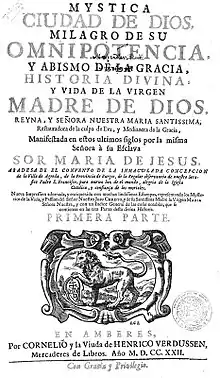
Mystical City of God is a book written in the 17th century by the Franciscan nun Venerable Mary of Jesus of Ágreda.
According to María de Ágreda, the book was to a considerable extent dictated to her by the Blessed Virgin Mary and regarded the life of the Virgin Mary and the divine plan for creation and the salvation of souls. The work alternates between descriptions of the Trinity, the Virgin Mary's life, and the spiritual guidance she provides to the author, by whom her words were reproduced for the spiritual benefit and growth of the reader. The book describes at length the various virtues, and how the reader should live in order to see them reflected in their own life, with the Virgin Mary as their model for sanctity. The work has the Imprimatur of several Popes and Bishops and appeals primarily to those who believe in private revelation and the sanctity of Mary. Non-Catholics generally do not accept the teaching of the Catholic Church and are consequently skeptical of works of this nature.
In 1673, María de Ágreda was declared venerable soon after her death, but the process of her beatification has yet to be completed.[1] Beatification and canonization do not authenticate revelations, however.[2]
Excerpt
"My daughter, one of the misfortunes, which deprive souls of happiness, or at least diminish it, is that they content themselves with performing good works negligently or without fervor, as if they were engaged in things unimportant or merely accidental. On account of this ignorance and meanness of heart few of them arrive at an intimate friendship of God, which they can attain only by fervent love. This is called fervent precisely because of its similarity to boiling water. For just as water is made to boil and foam by the fire, so the soul, by the sweet violence of the divine conflagration of love, is raised above itself and above all created things as well as above its own doings. In loving, it is more and more inflamed, and from this very love springs an unquenchable affection, which makes the soul despise and forget all earthly things while at the same time it becomes dissatisfied with all temporal goodness. And as the human heart, when it does not attain what it dearly loves (if that attainment is possible) is inflamed with ever greater desire of reaching it by other means; therefore, the loving soul, finds ever new things to strive after for the sake of the Beloved and all service will seem to it but little. Thus it will pass from good will to a perfect will, and from this to what will please the Lord still more, until it arrives at the most intimate union with Him and at a perfect conformation with the will of God." (The Mystical City of God, volume II, 594)
Controversy
Chapter 3 of Book 8 claims Mark the Evangelist wrote his Gospel in Hebrew while in Palestine, then translated his Gospel into Latin while in Rome,[3] whereas it was the opinion of several of the Church Fathers that Mark wrote his Gospel in Greek while in Rome.[4]
References
- ↑ The Cambridge history of Spanish literature By David Thatcher Gies, Cambridge University Press, 2004 ISBN 0-521-80618-6 page 157
- ↑ Co-Patronesses of Europe, 5 Yet there is no doubt that the Church, which recognized Bridget's holiness without ever pronouncing on her individual revelations, has accepted the overall authenticity of her interior experience.
- ↑ Mystical City of God Book 8, Chapter 3 Archived 2013-09-07 at the Wayback Machine The Evangelist Mark wrote his gospel four years later, in the forty-sixth year after the birth of Christ. He likewise wrote it in Hebrew and while in Palestine. Before commencing he asked his guardian angel to notify the Queen of heaven of his intention and to implore her assistance for obtaining the divine enlightenment for what he was about to write. The kind Mother heard his prayer and immediately the Lord commanded the angels to carry Her with the usual splendor and ceremony to the Evangelist, who was still in prayer. The great Queen appeared to him seated on a most beautiful and resplendent throne. Prostrating himself before Her, he said: "Mother of the Savior of the world and Mistress of all creation, I am unworthy of this favor, though I am a servant of thy divine Son and of Thyself." The heavenly Mother answered: "The Most High, whom thou servest and lovest, sends me to assure thee, that thy prayers are heard and that his holy Spirit shall direct thee in the writing of the Gospel, with which He has charged thee." Then She told him not to write of the mysteries pertaining to Her, just as She had asked saint Matthew. Immediately the Holy Ghost, in visible and most refulgent shape, descended upon saint Mark enveloping him in light and filling him with interior enlightenment; and in the presence of the Queen he began to write his Gospel. At that time the Princess of heaven was sixty-one years of age. Saint Jerome says that saint Mark wrote his short Gospel in Rome, at the instance of the faithful residing there; but I wish to call attention to the fact, that this was a translation or copy of the one he had written in Palestine; for the Christians in Rome possessed neither his nor any other Gospel, and therefore he set about writing one in the Roman or Latin language.
- ↑ Saint Augustine, Harmony of the Gospels Of these four, it is true, only Matthew is reckoned to have written in the Hebrew language; the others in Greek.
External links
- Works of Ven. Mary of Agreda Online PDFs of Mystical City of God
- Extracts from the Mystical City of God Compilation of Quotations from Mystical City of God
 Mystical City of God public domain audiobook at LibriVox
Mystical City of God public domain audiobook at LibriVox